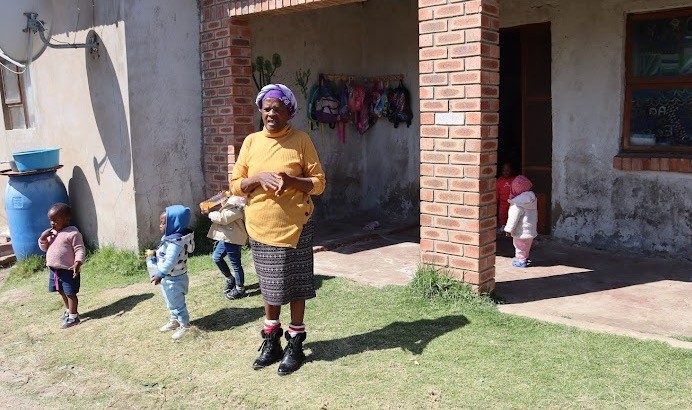
4 October 2023
Rosey Mbikwana is battling to feed the children who come to her day care centre in Mthatha. Photo: Nombulelo Damba-Hendrik.
Rosey Mbikwana looks after children in a room in her house in Mthatha, but she is struggling to feed the children, some of whom come to her day care centre with nothing but a bottle of sugar water.
Mbikwana says she started Ma Rosey’s Day Care Centre in 2021, at the request of young mothers who needed care for their children while they went out looking for work. From four children at first, the number has swelled to 20 children, aged from one month to five years.
“In this area we have a lot of young mothers who are unemployed and rely on the child support grant. In order for them to go out to look for a job, they need someone to look after their children,” she says.
“Chances are they will only find a job after a month or two; some look for the whole year with no luck. Because I know their struggle, I end up looking after their children for free. Some children are not getting the child support grant due to their mothers not having IDs. Some are raised by their grandparents, who are also unemployed. It’s a sad reality.”
Some children arrive at the centre with nothing but a bottle of sugar water and nothing for lunch. Others bring leftovers or bread without butter. Very few bring a fruit snack.
Mbikwana tries to provide mielie meal porridge in the morning and peanut butter sandwiches at lunch for those who have nothing to eat. But often she battles even to provide this.
According to Eastern Cape Department of Education spokesperson Malibongwe Mtima, day care centres are expected to provide a nutritious breakfast and lunch and snacks in the afternoon.
But at Ma Rosey’s, which gets no funding from the government, there is not nearly enough money for this.
Fees range from R150 to R400 a month, depending on the age of the child. In a good month, when most parents have managed to pay the fee, the day care centre makes approximately R3,500. But most months, most of the parents struggle to pay. Mbikwana’s assistant, Odwa Mbengo, gets a R800 stipend from Smart Start, an early childhood development programme.
The day GroundUp visited, five children had come to the centre without lunch, just sugar water in small bottles. Mbikwana had no money that day to make any mielie meal porridge.
Ma Rosey’s day care centre looks after 20 children. Photo: Nombulelo Damba-Hendrik
The centre opens at 6am and there’s no strict closing time. Some parents fetch their children very late, she says.
She said she once thought of closing but that would mean she would be leaving the children in the lurch. She applied for registration as a non-profit organisation to the Department of Social Development, but while she was waiting for the application to be processed, administration of early childhood development centres was transferred to the education department.
Mtima said the education department is subsidising 2,861 centres benefitting 86,814 children. Funding is R17 per child for 264 days a year.
But the process of applying for funding is complex. Applicants and staff must be screened against the Child Protection Register; the applicant must have at least Early Childhood Development National Qualifications Framework Level 4; and if the centre is in a residential area, the applicant must apply to the municipality for rezoning of the land that will be used for the centre.
Applicants are also expected to submit a business plan, a constitution, documents from the municipality, clinic or school, and banking documents.
Mbikwana said she intended to apply, but was afraid her application would not be approved, since she runs the centre from a room in her house.